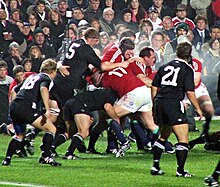
The 1999 Rugby World Cup, was the fourth Rugby World Cup, the quadrennial international rugby union championship, the first World Cup to be held in the sport's professional era.

The Australia national rugby union team, nicknamed the Wallabies, is the representative national team in the sport of rugby union for the nation of Australia. The team first played at Sydney in 1899, winning their first test match against the touring British Isles team.

The Wales national rugby union team represents Wales in men's international rugby union. Its governing body, the Welsh Rugby Union (WRU), was established in 1881, the same year that Wales played their first international against England. The team plays its home matches at the Millennium Stadium in Cardiff, which replaced Cardiff Arms Park as the national stadium of Wales in 1999.
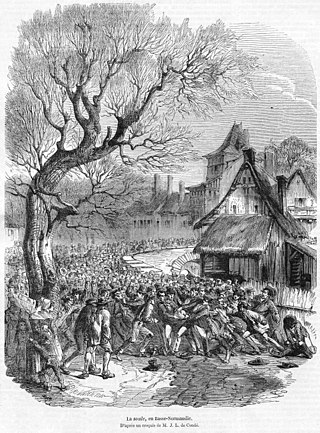
The history of rugby union follows from various football games long before the 19th century, but it was not until the middle of that century that the rules were formulated and codified. The code of football later known as rugby union can be traced to three events: the first set of written rules in 1845, the Blackheath Club's decision to leave the Football Association in 1863 and the formation of the Rugby Football Union in 1871. The code was originally known simply as "rugby football". It was not until a schism in 1895, over the payment of players, which resulted in the formation of the separate code of rugby league, that the name "rugby union" was used to differentiate the original rugby code. For most of its history, rugby was a strictly amateur football code, and the sport's administrators frequently imposed bans and restrictions on players who they viewed as professional. It was not until 1995 that rugby union was declared an "open" game, and thus professionalism was sanctioned by the code's governing body, World Rugby—then known as the International Rugby Football Board (IRFB).
Home Nations is a collective term with one of two meanings depending on context. Politically it means the nations of the constituent countries of the United Kingdom. In sport, if a sport is governed by a council representing the island of Ireland, such as the Irish Rugby Football Union (IRFU), the term can refer to the nations of the constituent countries on the island of Great Britain and the island of Ireland as a whole.
Association football is organised on a separate basis in each of the four constituent countries that make up the United Kingdom (UK), with each having a national football association responsible for the overall management of football within their respective country. There is no United Kingdom national football team. Football has been the most popular sport in the UK since the 1860s. Rugby union, rugby league and cricket are other popular sports.

Sport in the United Kingdom plays an important role in British culture and the United Kingdom has played a significant role in the organisation and spread of sporting culture globally. In the infancy of many organised sports, the Home Nations, England, Scotland, Wales, and Ireland were heavily involved in setting out the formal rules of many sports, and formed among the earliest separate governing bodies, national teams and domestic league competitions. After 1922, some sports formed separate bodies for Northern Ireland, though many continued to be organised on an all-Ireland basis. For this reason, in many though not all sports, most domestic and international sport is carried on a Home Nations basis, and England, Wales, Scotland and Ireland are recognised as national entities.
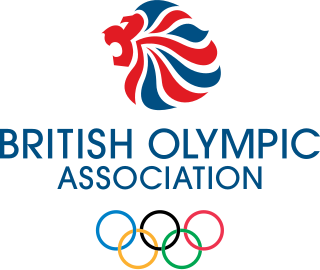
The British Olympic Association (BOA) is the National Olympic Committee for the United Kingdom. Founded in 1905, it is responsible for organising and overseeing the participation of athletes from the Great Britain and Northern Ireland Olympic Team, at both the summer and winter Olympic Games, the Youth Olympic Games, the European Youth Olympic Festivals, and at the European Games.

Athletes from the United Kingdom, all but three of its Overseas Territories, and the three Crown Dependencies, can compete in the Olympic Games as part of Team GB. Athletes from Northern Ireland can elect to represent either the UK or 'Team Ireland'. It has sent athletes to every Summer and Winter Games, since the start of the Olympics' modern era in 1896, including the 1980 Summer Olympics, which were boycotted by a number of other Western nations. From 1896 to 2020 inclusive, Great Britain & Northern Ireland has won 918 medals at the Summer Olympic Games, and another 32 at the Winter Olympic Games. It is the only national team to have won at least one gold medal at every Summer Games, lying third globally in the winning of total medals, surpassed only by the United States and the former Soviet Union.

Rugby union in England is one of the leading professional and recreational team sports. In 1871 the Rugby Football Union, the governing body for rugby union in England, was formed by 21 rugby clubs, and the first international match, which involved England, was played in Scotland. The England national team compete annually in the Six Nations Championship, and are former world champions after winning the 2003 Rugby World Cup. The top domestic men's club competition is Premiership Rugby, and English clubs also compete in international competitions such as the European Rugby Champions Cup. The top domestic women's competition is the Premier 15s.
Sport in England plays a prominent role in English society. Popular teams sports in England include field hockey, cricket, rugby union, rugby league, and netball. Major individual sports include badminton, athletics, tennis, boxing, golf, cycling, motorsport, and horseracing. Cricket is regarded as the national summer sport. Association football is the most popular sport, followed by Cricket, Tennis and Rugby. A number of modern sports were codified in England during the nineteenth century, among them cricket, rugby union, rugby league, football, field hockey, bandy, squash, tennis, and badminton. The game of baseball was first described in 18th century England.

Sport in Wales plays a prominent role in Welsh culture. Like the other countries of the United Kingdom, Wales enjoys independent representation in major world sporting events such as the FIFA World Cup and in the Rugby World Cup, but competes as part of Great Britain in some other competitions, including the Olympics.
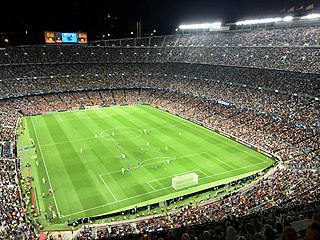
Sport in Europe tends to be highly organised with many sports having professional leagues. The origins of many of the world's most popular sports today lie in the codification of many traditional games, especially in the United Kingdom. However, a paradoxical feature of European sport is the extent to which local, regional and national variations continue to exist, and even in some instances to predominate.

The United Kingdom was awarded a number of major international sporting events during the 2010s leading to an idea of a 'Golden Decade' in British sport. The idea of the golden decade has been discussed in many newspapers and has been mentioned by former Prime Minister Gordon Brown and Lord Coe.

The British Triathlon Federation is the national governing body for triathlon, duathlon and associated multisport in Great Britain. It administers triathlon in England, Scotland, Wales, the Channel Islands and the Isle of Man. It represents Britain at the world body, the International Triathlon Union (ITU) and the regional body the European Triathlon Union (ETU). The BTF also selects athletes to represent the national team, at races such as the world triathlon series and the Olympic games.

Rugby league is played across England, Ireland, Scotland and Wales, but its heartland in parts of the North of England is where the sport is most popular, and is where the majority of professional clubs are based. The sport was first established in the George Hotel, Huddersfield, where 22 clubs split from the Rugby Football Union to form the Northern Rugby Football Union.
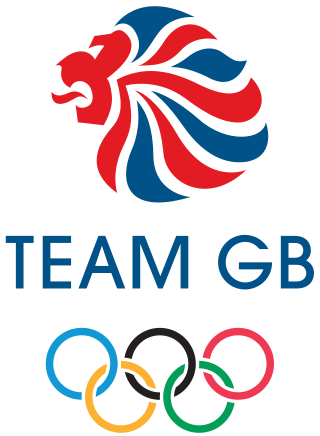
The Great Britain women's Olympic football team represents the United Kingdom in the women's football tournament at the Olympic Games. Normally, no team represents the whole of the United Kingdom in women's football, as separate teams represent England, Scotland, Wales and Northern Ireland.

Rugby sevens at the 2016 Summer Olympics was held over six days in August 2016 in Rio de Janeiro. The 2016 Olympics was the debut for rugby sevens at the Summer Olympics, though rugby union was last played at the 1924 games.

The Great Britain national rugby sevens team is the men's international rugby 7s team that is the representative team of Great Britain. The team competes in the annual World Rugby Sevens Series as well as the Olympic Games and European Games. Historically, Great Britain was represented in rugby 7s by England, Scotland and Wales but the inclusion of Rugby 7s at the Olympic and European Games, together with funding issues has resulted in the formation of a permanent combined team from 2023. The separate England, Scotland and Wales teams play in the Rugby World Cup Sevens and the Commonwealth Games.

The Great Britain national rugby sevens team is the women's Olympic representative team of Great Britain at the rugby sevens tournament at the Summer Olympic Games. The team played their first competitive match at the 2016 Summer Olympics after England finished in an Olympic qualifying place at the World Rugby Women's Sevens Series.
